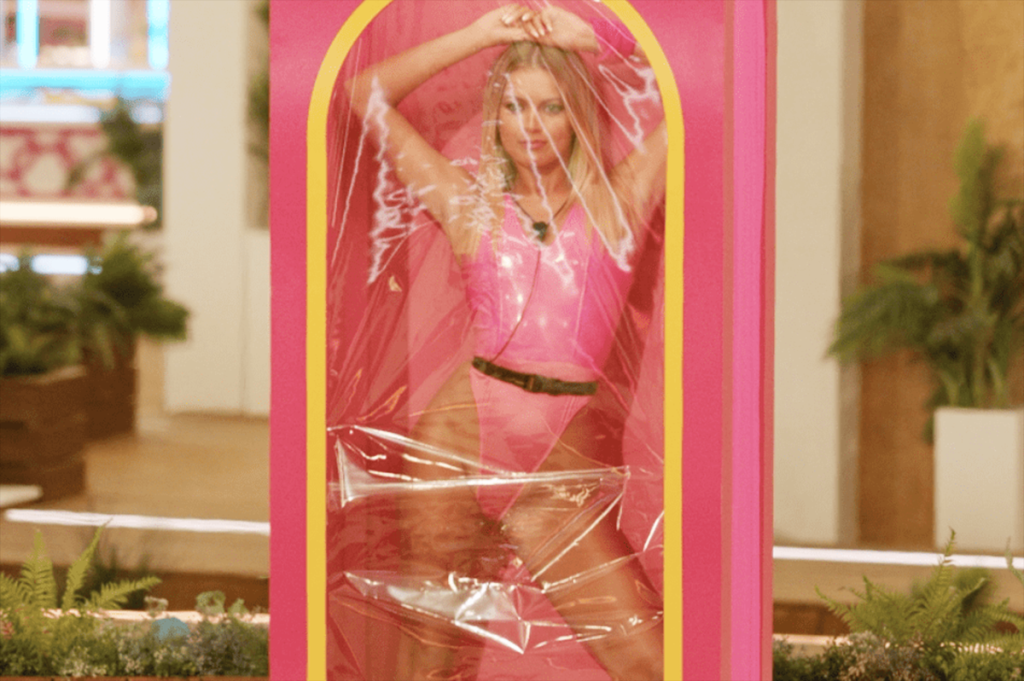Love Island‘s annual “heart race challenge” — where contestants perform jokily seductive dances on the opposite sex — took place last week, an eternity in villa time. The girls and boys who raise heart rates the most win. It is always divisive, since the women in particular — dressed in nearly nothing and maneuvering with everything they have — understandably get touchy when their man’s heart rate rises more for a rival.
Usually the challenge is extremely sexy, but not outright pornographic. This year that changed. We watched the women put their bare bums — most wore only thong-style garments — up in the men’s faces and waggle them before turning around and straddling them, mimicking full sex as well as oral sex and other sexual moves, like full-body licking. Shirtless, tight mini-short-sporting lads then picked the women up, monster-style, and put them face down on the ground before mounting them and commencing, with professional pornographic technique, rhythmic thrusting that showed off their toned athleticism. The inroads made by BDSM were extra clear in this year’s heart rate challenge: more than one contestant came out in leathers wielding a whip. The riding crop brandished by Gemma Owen, soccer player Michael Owen’s nineteen-year-old dressage champion daughter, was almost fetching.
As far as a heart rate challenge goes, it’s effective. Even as a relatively prim viewer I found myself grinning and adrenalized, staring with arrested fascination. Love Island contestants are often criticized for being too plastic and too surgically enhanced. But there is no doubt whatsoever that, surgery or no, they have burstingly brilliant bodies, and bar the odd comedy man, the contestants seem to be quasi-professionally trained in sexualized dancing. In other words they have scaled the heights of contemporary, endlessly digitally-refracted sexiness. They are masters at looking hot, having nailed the shortest route to the dopamine rush. Their métier is the shimmering depthlessness of young bodies who spend their lives taking selfies in no clothes, pouring their souls and sense of self into the tiny tripartite orbs of the iPhone lens.
The contestants seem more recognizable as people this year (sometimes they actually say things you could imagine a real person saying), but still seem utterly stumped when it comes to what lies beyond thongs and corner boob and pornographic dancing. Thus we have the anguished and perplexed tears of Tasha, a model and dancer of picture perfect looks, after the heart rate of Andrew, the man she was coupled up with, goes higher for Danica, single and unfancied at the time but later to pair up with a model at the explosive Casa Amor, where the men and women are sequestered with a new battery of the opposite sex. Tasha couldn’t accept that having got dressed in her tiny neon pink swimsuit, spent lots of time on looking perfect and unleashed her sexiest moves, Andrew’s machinery hadn’t processed the input correctly. Tasha correctly feared that in this world, if the body fails, you have nothing: all the warm words and bedtime cuddles count for nothing. Andrew’s romps only days later with new girl Coco in Casa Amor while Tasha’s back was turned turned those fears into reality.
Love Island is not everyone’s cup of tea — and for good reason. But the program is important because its contestants are at the bleeding edge of media culture. This means they set and reflect trends in fashion, dating, sexual ethics and modern relational sensibilities. They are creatures of Instagram and TikTok, where sexuality is kaleidoscopically disseminated and refracted.
The result is that sexiness has become a technique you can master and deploy so long as you do — and possess — the right things. Girls must wear thongs, have big boobs and a wobbly bum and put on hair extensions; the men must have a tan, a six pack, tattoos and white teeth.
But in this rubric, sexiness kills sex. Eros has long departed these shores; lust and desire remain and can be profound and raw forces even now. But for the islanders, and for Gen Z more widely, they seem to have drifted further out of reach. It becomes harder and thornier to instigate and enjoy sex, because there are so many psychological and political landmines. There is most definitely a right and a wrong way to do sex now, a world of feelings and power dynamics to which all must be hyper-attuned. Self-consciousness has been heightened by three-lens smartphone cameras that constantly show bodies as they should be and amplify the gap between them and reality.
And so, the two former functions of sex: sheer naughty fun, or an act of love (sometimes even baby-making) have essentially evaporated. No wonder sex rates have plummeted among the younger generation: 15 percent of twenty- to twenty-four-year-olds say they’re sexually inactive, compared to 6 percent of Gen X at the same age. A recent study by the charity Humen found that half of university students feel their experience has been marred by mental health issues: feeling perpetually anxious isn’t good for sex either.
In the absence of fun or love or babies, the conservative flank of Gen Z are searching for meaning. They have decided sex comes up short on that front too. This, at any rate, was my observation at a recent conference for eighteen- to thirty-year-olds interested in freedom. One young man of about twenty-four advocated a return to chastity outside marriage and baby-making. Watching the bulging-bodied Love Islanders gyrate and thrust, and then feel worthless and hurt, you can understand how for some, the enforced meaning — and danger — of a Handmaid’s Tale-style regime of sex could begin to seem, well, sexy.
This article was originally published on The Spectator’s UK website.


















